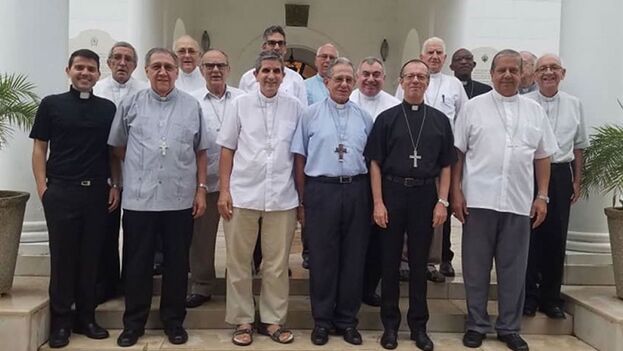
![]() 14ymedio, Havana, 1 December 2022 — On Wednesday, the Conference of Catholic Bishops of Cuba published a message in which it signaled “the hunger, loneliness and lack of freedom” experienced by the citizens of the Island and once again called for freedom for the political prisoners. The statement, whose theme is the preparation for Christmas, also recalls that 25 years ago the Government agreed to declare the day as a holiday.
14ymedio, Havana, 1 December 2022 — On Wednesday, the Conference of Catholic Bishops of Cuba published a message in which it signaled “the hunger, loneliness and lack of freedom” experienced by the citizens of the Island and once again called for freedom for the political prisoners. The statement, whose theme is the preparation for Christmas, also recalls that 25 years ago the Government agreed to declare the day as a holiday.
The bishops announced the visit, this coming January, of Cardinal Beniamino Stella, who served as apostolic nuncio — ambassador of the Vatican on the Island — during the Special Period. Stella, a top diplomat and critic of Castroism, was the one who organized the trip of Pope John Paul II in 1998, the first made by a pontiff to Cuba.
The commemoration of the half-century of that visit, which “marked the history” of relations between the Catholic Church and the Cuban Government, was proposed by the bishops to Pope Francis at a recent meeting in Vatican City. Beginning January 24, Stella will tour all Cuban dioceses, the statement says.
The rest of the message is dedicated by the prelates to reflecting on the current Cuban reality, avoiding the explicit mention of the responsibility of the Government in the different crises that the country is experiencing. They suggest that an atmosphere of “fear, distrust, daily routine, lies and hatred” prevails in Cuba.
They alluded to “the families who suffer emigration” and called, cryptically, to recognize the “signs,” that are “guiding, encouraging and warning us of the dangers” in the country in which our history is being “woven.” They also regretted the “pain and loneliness of so many elderly people, sick or suffering from serious difficulties and deficiencies.”
At the most critical moment of the statement, the bishops mentioned “those who suffer hunger, loneliness, lack of freedom and who expect from us a gesture of clemency or mercy. How much joy it would bring for their families and people in general to know that, this Christmas, a good number of those who are imprisoned would be granted freedom and returned to their homes to re-insert themselves into their usual lives and begin the new year!” they declared.
The requests of amnesty for the prisoners have been frequent on the part of the Catholic Church, which in 2015 took advantage of the visit of Pope Francis and managed to get the Government to release more than 3,500 inmates. However, it has had little success in its demands for release of Cubans detained after the protests of July 11, 2021.
They called for the hope of the Cuban people “in the midst of so much darkness and discouragement,” and to commit to the transformation of history “from within.” “No one can fight in life in isolation,” they said, while pointing out the need for a “community, a homeland of brothers where everyone can live with dignity, where we listen to each other and engage in dialogue to discern the future, where we fight for the good of all, especially those who have been marginalized for different reasons.”
The text concludes by sending the blessing of the prelates to the Cubans of the Island and to those who are “dispersed around the world.”
For Jorge, a Catholic layman from the diocese of Santa Clara consulted by 14ymedio, the message of the bishops “has to do more with forgiveness,” although “the situation in Cuba stands out: hopelessness, sadness, divisions.”
“Some of us believe that the messages could be more out front against the Government,” he says, “but the bishops didn’t forget the families who suffer from the emigration of their members, the condition of the prisoners, the pain and loneliness of the elderly, those who suffer great shortages and lack of liberty. It’s a very simple message that is more about hope,” he says.
Jorge points out that the most interesting thing in the statement is the announcement of Cardinal Stella’s visit, “a nuncio who knows our reality perfectly.” The Vatican envoy will find, he thinks, “a Government that is on the defensive,” which will not welcome this visit or will interpret it as “supervision.” In addition, “they won’t have much time to prepare.”
Cardinal Beniamino Stella’s last visit to the Island took place in 2015, in the midst of the “thaw” between Cuba and the United States. His return occurs in a similar context, when new attempts at dialogue are being developed between the two Governments, which, unlike the last time, have dispensed with the mediation of the Catholic Church.
Translated by Regina Anavy
____________
COLLABORATE WITH OUR WORK: The 14ymedio team is committed to practicing serious journalism that reflects Cuba’s reality in all its depth. Thank you for joining us on this long journey. We invite you to continue supporting us by becoming a member of 14ymedio now. Together we can continue transforming journalism in Cuba.
